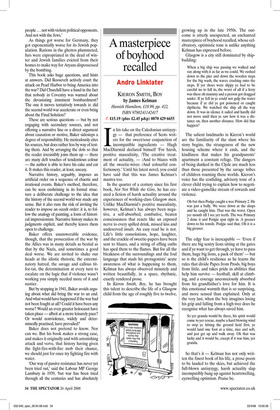A masterpiece of boyhood recalled
Andro Linklater
KIERON SMITH, BOY by James Kelman Hamish Hamilton, £18.99, pp. 422, ISBN 9780241142417 ✆ £15.19 (plus £2.45 p&p) 0870 429 6655 In his take on the Caledonian antisyzygy — that preference of Scots writers for the sweet/sour conjunction of incompatible ingredients — Hugh MacDiarmid declared himself ‘For harsh, positive masculinity, /The creative treatment of actuality, — /And to blazes with all the sweetie-wives /And colourful confectionery.’ Until his latest novel, you could have said that this was James Kelman’s mantra too.
In the quarter of a century since his first book, Not Not While the Giro, he has created a fiction of harsh actuality around the experiences of working-class Glasgow men. Unlike MacDiarmid’s positive masculinity, however, Kelman’s has always been negative, a self-absorbed, combative, beaten consciousness that reacts like an exposed nerve to every spilled drink, missed kiss and undeserved insult. An easy read he is not. Life’s little consolations, hope, laughter, and the crackle of sweetie-papers have been sent to blazes, and a string of effing oaths has sped them to the flames. But for all the bleakness of the surroundings and the foul language that studs his protagonists’ acute awareness of what is happening to them, Kelman has always observed minutely and written beautifully, in a spare, rhythmic, exactly rendered prose.
In Kieron Smith, Boy, he has brought this talent to describe the life of a Glasgow child from the age of roughly five to twelve, growing up in the late 1950s. The outcome is utterly unexpected, an enchanted masterpiece of boyhood recalled, whose celebratory, optimistic tone is unlike anything Kelman has expressed before.
Glasgow is a city still dominated by shipbuilding:
When a big ship was passing we walked and ran along with it as far as we could. We rushed down to the pier and down the wooden steps for the big wash, the waves crashing onto the steps. If yer shoes were slippy ye had to be careful no to fall in, the worst of all if a ferry was there oh mammy and a person got dragged under. If ye fell in ye could not gulp the water because if ye did ye got poisoned or caught diptheria. We watched the ship all the way down. It was in silence it sailed and hardly did not move until then ye saw how it was a distance on, then another distance. How did that happen?
The salient landmarks in Kieron’s world are the familiarity of the slum where his story begins, the strangeness of the new housing scheme where it ends, and the kindliness that makes his grandparents’ apartment a constant refuge. The dangers of being dunked in the Clyde are much less than those presented by the savage tribes of children roaming these worlds. Kieron’s voice has the confiding, advisory tone of a clever child trying to explain how to negotiate a video-gamelike stream of rewards and violence.
Oh but then Podge caught a wee Primary 2. He was just a bully. We were down at the shops and he caught him. That was the worst. Open yer mouth till I see yer teeth. The wee Primary 2 done it and Podgie spat right in. A greaser down to his tonsils. Podgie said that, Oh it is a big greaser.
The edgy fear is inescapable — ‘Even if there are big sentry lions sitting at the gates and if ye want to get through, ye have to pass them, huge big lions, a pack of them’ — but so is the child’s resilience as he learns the rules that divide Papes from Prods, big boys from little, and takes pride in abilities that help him survive — football, skill at climbing, and a courage unconsciously absorbed from his grandfather’s love for him. It is this emotional warmth that is so surprising, and more sensed than explained. Only at the very last, when the boy imagines losing his grip and falling from a high tree does he recognise what has always saved him.
So yer granda would be there, his spirit would come to yer rescue, maybe a hard blowing wind to stop ye hitting the ground heid first, ye would land one foot at a time, nice and soft, and just get up and walk away. Oh that was lucky and it would be, except if it was him, yer granda.
So that’s it — Kelman has not only written the finest book of his life, a prose poem to be lauded to the skies, but achieved the full-blown antisyzygy, harsh actuality slap incompatibly bang up against heartswelling, eyewelling optimism. Praise be.










































































 Previous page
Previous page